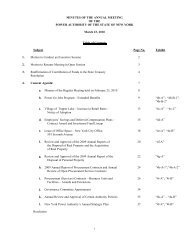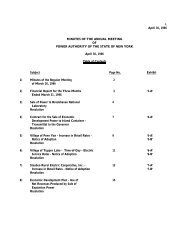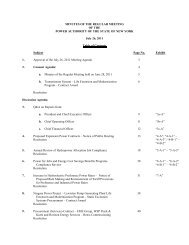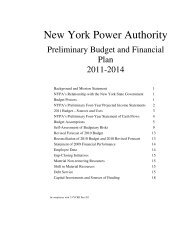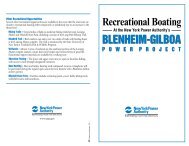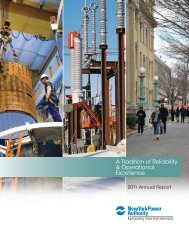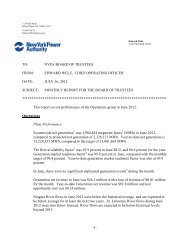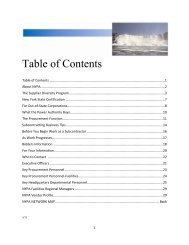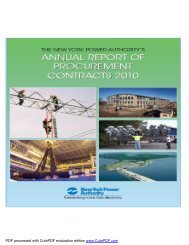Minutes of the Annual Meeting of the Power - New York Power ...
Minutes of the Annual Meeting of the Power - New York Power ...
Minutes of the Annual Meeting of the Power - New York Power ...
Create successful ePaper yourself
Turn your PDF publications into a flip-book with our unique Google optimized e-Paper software.
April 24, 2007<br />
analyses and rate approvals by <strong>the</strong> Authority’s Trustees. This is a long-settled matter and MEUA’s recommendation<br />
should not be accepted.<br />
CoS Credit for Sales <strong>of</strong> Unforced Capacity (‘UCAP’) into NYISO: The NS Customers propose that <strong>the</strong> Authority<br />
include a UCAP revenue credit for anticipated sales in <strong>the</strong> proposed CoS. Staff has been including and <strong>the</strong><br />
customers have been receiving a credit for short-term sales <strong>of</strong> capacity above <strong>the</strong> base level <strong>of</strong> capacity sales in <strong>the</strong><br />
annual RSR reconciliation. This calculation is performed after <strong>the</strong> actual amounts for <strong>the</strong> year are known. A review<br />
<strong>of</strong> <strong>the</strong> monthly auction prices <strong>of</strong> Rest <strong>of</strong> State Capacity for <strong>the</strong> past four years shows a fluctuation <strong>of</strong> prices between<br />
$0.25/kW-month to $3.30/kW-month. This market price volatility, toge<strong>the</strong>r with <strong>the</strong> natural uncertainty in <strong>the</strong><br />
amount <strong>of</strong> excess capacity available from <strong>the</strong> Hydro Projects, make forecasting a UCAP credit for inclusion into<br />
current rates problematic. Staff does not recommend adopting this change.<br />
Request for Credits for Energy Sales into NYISO: The NS Customers acknowledge that <strong>the</strong> Authority’s ratemaking<br />
methodology includes a cost-based credit for <strong>the</strong> all sales <strong>of</strong> energy made into <strong>the</strong> NYISO, which is reflected in <strong>the</strong><br />
annual reconciliation to <strong>the</strong> RSR, but none<strong>the</strong>less assert that a credit to <strong>the</strong> CoS for such sales should be made in<br />
deriving <strong>the</strong> base hydro rates based on <strong>the</strong> full market revenues <strong>the</strong> Authority garners in <strong>the</strong> NYISO markets.<br />
Because this is a collateral attack on Auer settlement principles, which all <strong>of</strong> <strong>the</strong> customers have accepted as direct<br />
signatories or through <strong>the</strong>ir power contracts, <strong>the</strong>re is no adjustment warranted. As <strong>the</strong> Staff Analysis explains, <strong>the</strong><br />
customers have no entitlement to <strong>the</strong> revenues <strong>of</strong> <strong>the</strong> Hydro Projects due to energy sales into <strong>the</strong> NYISO because<br />
once <strong>the</strong> cost-based rate is set, any revenues above cost garnered from o<strong>the</strong>r sales may be deposited into <strong>the</strong> general<br />
fund <strong>of</strong> <strong>the</strong> Authority and such excess revenues should not be used to produce preference rates that are below cost.<br />
Staff recommends no CoS adjustment based on <strong>the</strong> NS Customers’ claim.<br />
Request for Credits Based on Authority Investment Income: The NS Customers argue (with NYAPP concurring)<br />
that <strong>the</strong> Authority’s investment income should be treated as derived from ‘customer-contributed’ capital and<br />
<strong>the</strong>refore credited against <strong>the</strong> CoS. This novel argument again runs counter to <strong>the</strong> ratemaking principles established<br />
by contract. The preference rates are cost-based rates where no working capital charge is included and no real rate<br />
<strong>of</strong> return is earned. A portion <strong>of</strong> <strong>the</strong> Authority’s investment income is derived from <strong>the</strong> Hydro Projects, but <strong>the</strong><br />
Authority’s investments are not preference-customer-contributed capital for which <strong>the</strong> interest must be credited to<br />
<strong>the</strong> preference customers. A claim for a share <strong>of</strong> <strong>the</strong> Authority’s investment income would produce preference rates<br />
that are below cost in violation <strong>of</strong> Auer settlement principles. Yet that is exactly <strong>the</strong> result if investment income<br />
derived from such excess revenues is used as a credit to <strong>the</strong> CoS. Staff recommends that no credit to <strong>the</strong> CoS be<br />
provided for Authority investment income.<br />
Treatment <strong>of</strong> Headquarters Expense in Shared Services: MEUA and NYAPP both contend that certain elements <strong>of</strong><br />
<strong>the</strong> Headquarters Expense portion <strong>of</strong> <strong>the</strong> Shared Services allocated to <strong>the</strong> CoS should be reallocated to o<strong>the</strong>r cost<br />
categories. MEUA proposes redistributing <strong>the</strong> allocation based on <strong>the</strong> organizational title <strong>of</strong> each department<br />
included in <strong>the</strong> Headquarters component <strong>of</strong> <strong>the</strong> Shared Services cost category. NYAPP makes <strong>the</strong> fur<strong>the</strong>r claim that<br />
certain Headquarters functions should be allocated based on NYISO market revenues. As explained in <strong>the</strong> Staff<br />
Analysis, certain cost centers within <strong>the</strong> Headquarters departments are more correctly allocated based on <strong>the</strong><br />
functions <strong>the</strong>y perform ra<strong>the</strong>r than a straight labor allocation. As a result, staff has recalculated <strong>the</strong> Headquarters<br />
component <strong>of</strong> <strong>the</strong> Shared Services category, and recommends reducing <strong>the</strong> Shared Services by $3 million for 2007<br />
and $2.9 million for 2008 to be reflected in <strong>the</strong> attached revised CoS. The Staff Analysis also explains that<br />
NYAPP’s proposal to allocate such costs based on revenues runs contrary to <strong>the</strong> Authority’s cost-based ratemaking<br />
methodology. No fur<strong>the</strong>r adjustment is recommended.<br />
Incentive Pay Component <strong>of</strong> Shared Services: MEUA and NYAPP contend that <strong>the</strong> Incentive Pay portion <strong>of</strong> <strong>the</strong><br />
Shared Services allocated to <strong>the</strong> CoS is overstated. MEUA infers that <strong>the</strong> $1.2 million allocated for this component<br />
already includes <strong>the</strong> separate, directly assigned Hydroelectric Production component <strong>of</strong> $1 million, resulting in an<br />
overstatement <strong>of</strong> <strong>the</strong> allocation by $247,800 for each <strong>of</strong> <strong>the</strong> proposed rate years. As explained in <strong>the</strong> Staff Analysis,<br />
<strong>the</strong> Incentive Pay allocation is appropriate because such costs are not included in <strong>the</strong> annual budget process and<br />
<strong>the</strong>refore not included in <strong>the</strong> projected O&M budget. Incentive Pay is expensed in <strong>the</strong> year awarded if <strong>the</strong> goals<br />
approved by <strong>the</strong> Trustees are met. Staff recommends no change to this component <strong>of</strong> <strong>the</strong> CoS.<br />
Inclusion <strong>of</strong> Research & Developments (‘R&D’) Costs: MEUA, NS Customers and NYAPP argue that most, if not<br />
all, <strong>of</strong> <strong>the</strong> Authority’s R&D costs should not be allocated to <strong>the</strong> CoS. All parties contend that most <strong>of</strong> <strong>the</strong> programs<br />
25



